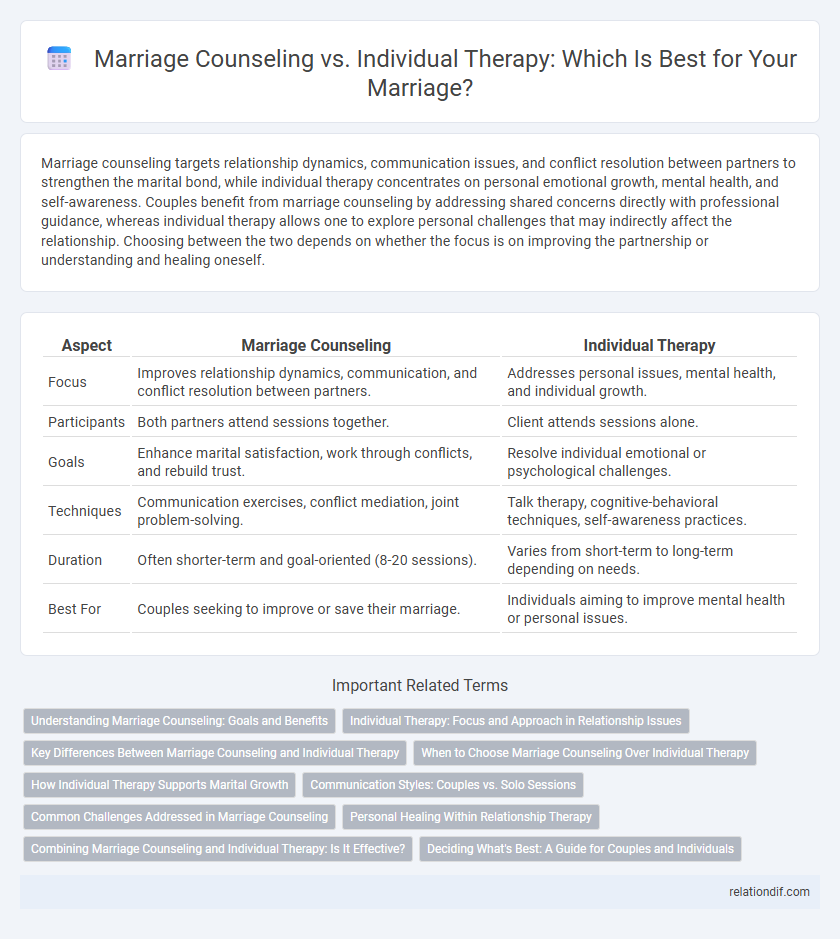Marriage counseling targets relationship dynamics, communication issues, and conflict resolution between partners to strengthen the marital bond, while individual therapy concentrates on personal emotional growth, mental health, and self-awareness. Couples benefit from marriage counseling by addressing shared concerns directly with professional guidance, whereas individual therapy allows one to explore personal challenges that may indirectly affect the relationship. Choosing between the two depends on whether the focus is on improving the partnership or understanding and healing oneself.
Table of Comparison
| Aspect | Marriage Counseling | Individual Therapy |
|---|---|---|
| Focus | Improves relationship dynamics, communication, and conflict resolution between partners. | Addresses personal issues, mental health, and individual growth. |
| Participants | Both partners attend sessions together. | Client attends sessions alone. |
| Goals | Enhance marital satisfaction, work through conflicts, and rebuild trust. | Resolve individual emotional or psychological challenges. |
| Techniques | Communication exercises, conflict mediation, joint problem-solving. | Talk therapy, cognitive-behavioral techniques, self-awareness practices. |
| Duration | Often shorter-term and goal-oriented (8-20 sessions). | Varies from short-term to long-term depending on needs. |
| Best For | Couples seeking to improve or save their marriage. | Individuals aiming to improve mental health or personal issues. |
Understanding Marriage Counseling: Goals and Benefits
Marriage counseling focuses on improving communication, resolving conflicts, and strengthening the partnership between spouses by addressing relational dynamics and shared challenges. Its goals include fostering emotional intimacy, building mutual trust, and developing effective problem-solving skills tailored to the couple's specific issues. Benefits of marriage counseling involve enhanced relationship satisfaction, prevention of separation or divorce, and promoting a healthier family environment.
Individual Therapy: Focus and Approach in Relationship Issues
Individual therapy in relationship issues centers on personal growth and self-awareness, addressing individual patterns and emotional regulation that impact the partnership. Therapists utilize techniques like cognitive-behavioral therapy and psychodynamic approaches to help clients explore underlying fears, attachment styles, and communication skills. This focused approach empowers individuals to improve relationship dynamics by fostering emotional resilience and healthier interpersonal interactions.
Key Differences Between Marriage Counseling and Individual Therapy
Marriage counseling centers on resolving conflicts between partners, improving communication, and strengthening the relationship, while individual therapy focuses on personal growth, mental health issues, and self-exploration tailored to one person's needs. Key differences include the involvement of multiple clients in marriage counseling versus a single client in individual therapy, as well as the scope of therapy goals, which are relational in marriage counseling and introspective in individual therapy. Therapists specializing in marriage counseling often address dynamics and patterns between partners, whereas individual therapy targets personal emotional challenges and cognitive processes.
When to Choose Marriage Counseling Over Individual Therapy
Marriage counseling is most effective when both partners seek to improve communication, resolve conflicts, or rebuild trust within the relationship. Choosing marriage counseling over individual therapy is ideal when issues directly impact the couple's dynamic rather than personal mental health concerns. Couples experiencing recurring arguments, emotional disconnection, or facing major life transitions benefit from joint sessions that foster mutual understanding and collaborative problem-solving.
How Individual Therapy Supports Marital Growth
Individual therapy supports marital growth by addressing personal issues such as communication skills, emotional regulation, and past traumas that affect relationship dynamics. It enhances self-awareness and emotional resilience, allowing partners to contribute more constructively to the marriage. Improving individual mental health through therapy fosters empathy and conflict resolution, which are critical for marital harmony.
Communication Styles: Couples vs. Solo Sessions
Marriage counseling emphasizes improving communication styles between partners by facilitating shared dialogue and mutual understanding, tailoring strategies to the dynamics of the relationship. Individual therapy focuses on personal communication patterns, emotional regulation, and self-awareness to enhance one's ability to express thoughts and feelings effectively. Couples therapy addresses interpersonal challenges directly, while solo sessions build foundational skills that can positively influence relational interactions.
Common Challenges Addressed in Marriage Counseling
Marriage counseling primarily addresses common challenges such as communication breakdown, trust issues, and conflict resolution between partners. It also focuses on improving emotional intimacy and navigating major life transitions that affect the relationship. Therapists guide couples in developing healthy coping strategies and rebuilding connection to strengthen their marital bond.
Personal Healing Within Relationship Therapy
Marriage counseling integrates personal healing by addressing individual emotional needs within the relationship context, promoting mutual understanding and growth. Individual therapy complements this by focusing deeply on personal issues that affect relationship dynamics, such as trauma or communication patterns. Combining both approaches enhances emotional resilience and supports healthier, more connected partnerships.
Combining Marriage Counseling and Individual Therapy: Is It Effective?
Combining marriage counseling and individual therapy often enhances relationship outcomes by addressing both joint dynamics and personal issues concurrently, allowing for deeper emotional insight and improved communication between partners. Research shows that couples engaging in both modalities experience increased empathy, better conflict resolution, and a stronger relational foundation. Integrating these therapeutic approaches creates a comprehensive treatment plan, supporting individual growth while fostering healthy partnership development.
Deciding What's Best: A Guide for Couples and Individuals
Marriage counseling focuses on improving communication and resolving conflicts between partners by addressing relational dynamics and shared goals. Individual therapy targets personal growth, emotional healing, and self-awareness, which can indirectly benefit the relationship. Couples should evaluate their primary needs--whether joint problem-solving or individual emotional support--to decide between marriage counseling and individual therapy.
Marriage Counseling vs Individual Therapy Infographic

 relationdif.com
relationdif.com